Commentary: QAnon – how a conspiracy-consuming community persists, despite its leader going MIA
From its humble beginnings in drops posted by a prophet-like figure on 4chan, QAnon has evolved to become a social movement that continues to thrive despite being driven underground, says William Cooper.
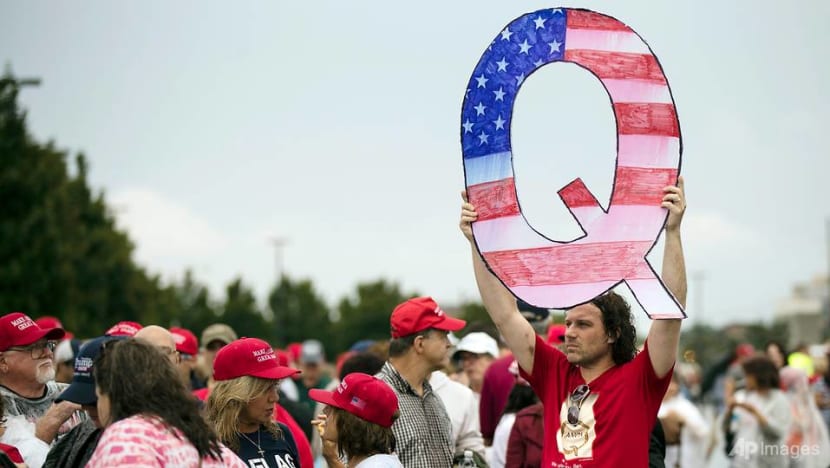
In this Aug 2, 2018 file photo, a protesters holds a Q sign waits in line with others to enter a campaign rally with President Donald Trump in Wilkes-Barre, Pennsylvania. (Photo: AP/Matt Rourke)
TRUCKEE, California: It has been six months since Q posted a drop but the once-tiny movement he ignited – QAnon – has arguably only grown stronger.
Some of Q’s most diehard followers are still clinging to the idea that Donald Trump will make a stunning return to vanquish his enemies and reclaim his stolen election.
A new report released just this week by the Federal Bureau of Investigation and Department of Homeland Security warned that QAnon adherents could target Democrats and other political opponents for more violence as the movement's false prophecies don’t come true.
It has also been barely a week since disgraced former national security advisor Michael Flynn - who received a presidential pardon while Trump was in office - suggested a military coup to prevent Joe Biden from taking office would have been appropriate. He has since walked back on those comments made at a Dallas event for QAnon supporters.
Such remarks should come as little surprise when antics of talking big has been part and parcel of the QAnon playbook.
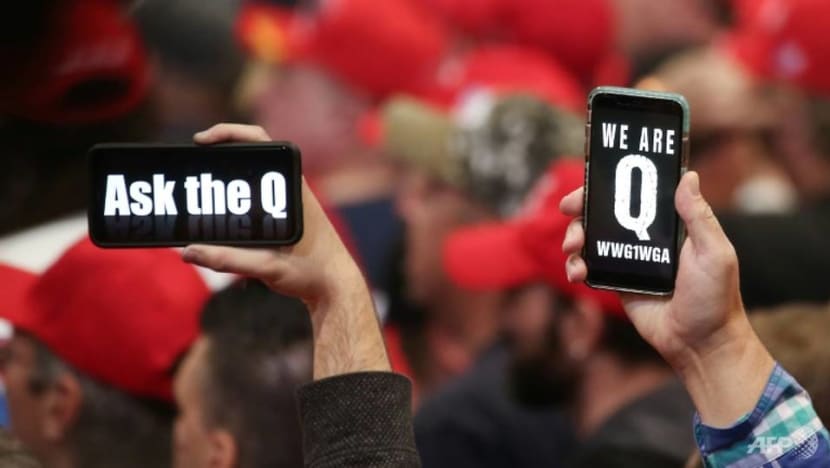
READ: Commentary: Banning disruptive online groups is a pointless game of whack-a-mole
Even when the US presidential election results were unequivocally pointing to a Biden-Harris win, lawyer Sidney Powell - who was part of Donald Trump's legal team – had played to QAnon supporters in calling the case she was mounting a "kraken" that, when released, would erase the possibility that Joe Biden won the presidency.
It turned out to be a stack of documents spewing conspiracy theories including the idea that Venezuelan President Hugo Chavez’s family owned the technology company Dominion Voting systems that supposedly rigged the election – all of which turned out to be baseless allegations.
QANON’S HUMBLE BEGINNINGS
QAnon emerged as a fringe group at the margins of American society in late 2017 after Trump was elected president.
It started with a post by an individual going by the moniker Q Clearance Patriot on an Internet message board hosted by 4chan, who then migrated to other message boards 8chan and then 8kun.
Q is often thought of by his followers as a senior US government official with access to highly classified and confidential information relating to Trump’s effort to bring down a global liberal cabal.
Q’s real identity has never been established, though there has no lack of speculation about who he is, including the possibility that Q is a group of people acting in concert
At some point, people thought Steve Bannon was Q. A few also suspected Trump was Q. And after the Q: Into the Storm premiered on HBO earlier this year, others thought Ron Watkins, the 8kun site administrator was it.
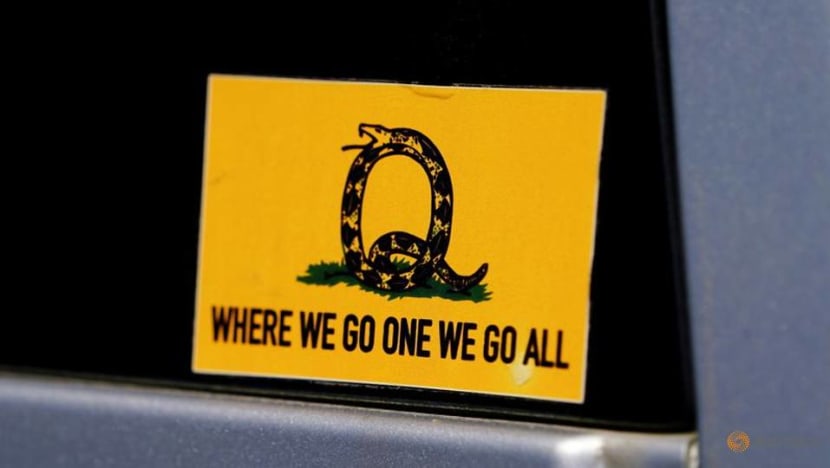
As if the identify of the group’s leader wasn’t mysterious enough, what was in those messages he left - the drops - were even stranger.
From 2017 to 2020, Q had posted more than 5,000 pretty cryptic messages. They were wildly appealing to followers because of their intriguing nature – from the enticing alleged ties to the US government and suggestions of sensitive, highly classified government information not normally available to ordinary Americans to the draw of ambiguously worded messages that left ample room for the imagination.
READ: Commentary: Redpilling, rabbit holes and how far-right ideology spreads in online spaces
READ: Commentary: The nightmarish end to Donald Trump’s presidency
QAnon supporters spent so much time trying to decipher and analyse what these drops meant, there were even YouTube channels of QAnon influencers who dedicated themselves to breaking each one down.
Even so, QAnon adherents are a diverse bunch. At the extreme are those who believe in the most deranged set of Internet conspiracy theories, including allegations that former President Donald Trump was battling an elite group of Satan worshiping pedophiles in the deep state.
To them, this group of global elites includes leading liberal figures in the United States such as Joe Biden, Barack Obama, Oprah Winfrey, and a number of others on Wall Street and in Hollywood.
Many QAnon supporters also believe that Trump was recruited to run for president by top military leaders in order to break up this criminal ring and send its members to jail. They still believe these liberals will eventually be imprisoned at Guantánamo Bay and face the prospect of execution.
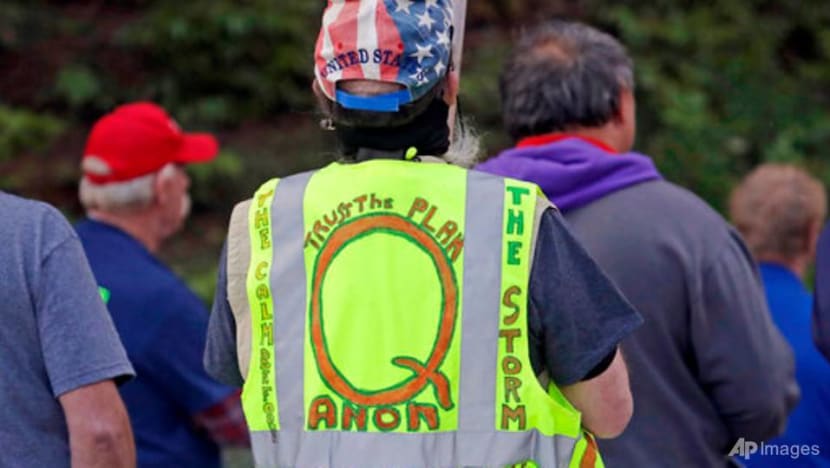
Then there are other supporters who only subscribe to QAnon’s broader principles of distrusting establishment narratives and questioning the information presented by traditionally authoritative sources.
HOW QANON JUMPED INTO THE MAINSTREAM
Since 2017, QAnon has jumped from message boards in the dark corners of the Internet to stories in the US media and Trump rallies, and claimed a large following for itself.
Its leap to Reddit on a community called Calm Before The Storm tapped into a larger base, where supporters drove discussions among subscribers to amplify Q’s drops and QAnon matters.
QAnon also spilled into the real world and raised a ruckus, from disobeying COVID-19 rules to staging confrontations with Black Lives Matter protesters and culminating in the January storming of the US Capitol.
QAnon found legitimacy despite the disorder and disinformation it perpetrated - in US Republican representatives Marjorie Taylor Green speaking up openly in support of the group and when then-President Trump retweeted accounts with links to the group.
Indeed, the group may only be getting even more traction as Trump being out of the White House gives them a cause to really rally behind.

Biden’s inauguration should have decimated the movement when QAnon supporters had preached that Biden and other Democrat criminals would be arrested and executed on the orders of Trump by Jan 20, an event they call “The Storm”, but it nonetheless continues to hold strong among its most ardent supporters.
READ: Commentary: We need to talk about how Donald Trump’s presidency wasn’t a complete disaster
READ: Commentary: Why did George Floyd protests gain traction worldwide – including Asia?
WHAT SHOULD BE DONE?
The same place to understand where QAnon rose is where to look to figure out how to diminish it: The Internet.
While Q’s messages were initially published on fringe message boards, social media giants including Twitter, Facebook and YouTube amplified the message by providing a platform for followers and believers to use as megaphones.
This year, however, these leading Internet companies have taken steps to ban QAnon content from their websites, in part fuelled by the events of Jan 6 and in part because the group was no longer associated with the man occupying the White House.
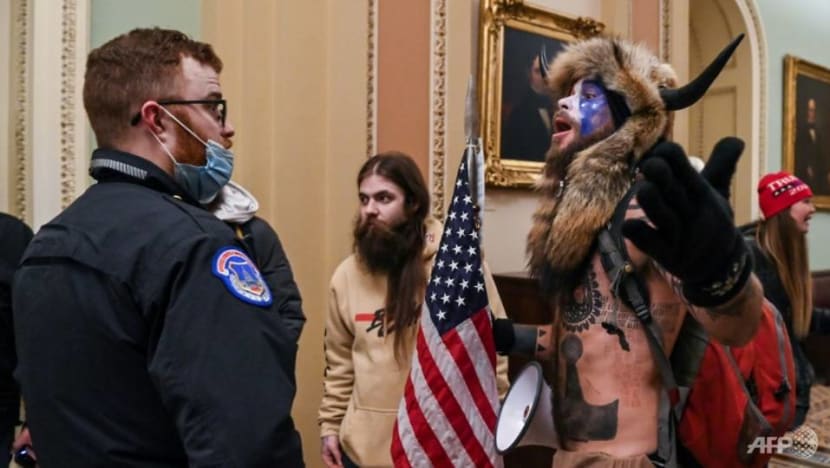
Although these crackdowns have pushed QAnon supporters and their deranged fantasies off those platforms, however, that has only succeeded in driving them underground where they cannot be tracked.
Many have found new ways to flourish on Telegram where encrypted chats with tens of thousands of followers mean parties wondering into their channels may find themselves in rabbit holes of even crazier, interconnected conspiracies where people can discuss their delusional beliefs 24/7 and feed off each. It is a deranged flywheel accelerating each day.
Perhaps that is where the danger lies. When opponents take steps to limit QAnon's influence, these only seem to fuel its growth and intensity.
QAnon supporters are undoubtedly infecting mainstream political attitudes. A recent poll by NPR found that 17 per cent of Americans believe that “a group of Satan-worshiping elites who run a child sex ring are trying to control our politics and media”, while almost 37 per cent didn’t know if they were real or not.
QAnon has moved beyond a political movement to become a social community that engages, entertains and provides structure and organisation to make sense of their world in a manner other US social institutions do not seem to achieve.
The question is thus not whether QAnon will still be a part of American society but rather how influential a fixture in American society it will be.
(Listen to Prof Chan Heng Chee and BowerGroupAsia Managing Director James Carouso explain how America came to be so deeply divided amid a bitterly fought election on CNA's Heart of the Matter podcast episode published in November 2020.)
William Cooper is a global commentator on US politics and an attorney based in Truckee, California. He is also author of the forthcoming Toxic: Donald Trump and the Rule of Law by Black Spring Press in London.














